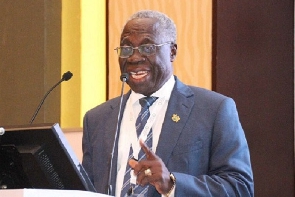Yaw Osafo-Maafo, Senior Presidential Advisor, has entreated the Ministry of Finance to consider improving and aligning the conditions of service of the Internal Audit Agency (IAA) staff with their counterparts in the revenue and accounting class.
Doing so, he said, would ensure fairness and equity among professionals with similar backgrounds, while solving a recruitment challenge of attracting top professionals into Internal Audit Agency.
“Let us make sure that the one who is to prevent the misuse of resources is also compensated adequately,” he said.
Mr Osafo-Maafo was speaking at the opening of the 2023 Annual Internal Audit Conference, being held under the theme: “20 years of Internal Audit Practice in Ghana: Achievements, Challenges and Way Forward”.
He said a revised Internal Audit Agency Law was long overdue, bearing in mind that two out of the three public financial management laws that were passed in 2003 had either been repealed or amended after two decades.
These are the Financial Administration Act, Public Procurement Act, and the Internal Audit Agency Act.
An amendment to the IAA Act, he said, would go a long way to deepen objectivity of the internal auditors and provide the Agency the needed protection and independence to carry out its mandate of not only identifying malfeasance but also taking corrective steps to prevent them.
“If you ignore the one to ensure that your own set of rules and regulations and professional guidelines are adhered to, then you are endangering the system,” he said.
The former Minister of Finance also observed that for too long some government appointees had been at loggerheads with Internal auditors as they were regarded as fault finding persons or “opponent number one” in the institution.
He, therefore, charged the IAA to devise means of regularly educating all government appointees on corporate governance, risk management and internal control processes.
Highlighting the achievements of the IAA, Dr. Oduro Osae, the Director- General of the Agency, said that his outfit had managed to reduce financial infractions significantly across various public institutions.
The Metropolitan, Municipal, and District Assemblies (MMDCEs), however, he noted, had recorded an increase in financial infractions by 48 percent, the highest by any public institution between 2021 and 2022.
The infractions, he said, were due to the direct supervision of the internal audit committees of the MMDCEs by the Local Government Service.
Consequently, the passage of the Act would wean the committees from service and make them subject to the authority of the Agency.
The weaning, he said, would make the committees more independent and empower them to identify infractions in public institutions.
Dr. Janet Ampadu Fofie, the immediate Past Chairperson of Public Service Commission, advised the internal auditors to be proactive in their quest to identify financial infractions in the public sector.
She said the internal auditors must be “security blanket” to ensure public officials adhered to the Public Financial Management Act (PRMA) to ensure the judicious use of state resources.
She said the Independence of auditors should be non-negotiable since the auditors were gateways to the fight against corruption.
Professor John Kwaku Mensah Mawutor, Pro Vice Chancellor of the University of Professional Studies Accra (UPSA), urged internal auditors to be wary of Artificial Intelligence (AI), which posed a threat to the relevance of the profession.
He advised them to add value to themselves in the contemporary world of work where Information Technology (IT) was the driving tool.
Prof Mawutor advised training institutions and professional bodies to incorporate IT into their training module to ensure that internal auditors were not left behind in fast changing world of work.
Business News of Saturday, 16 September 2023
Source: GNA

















